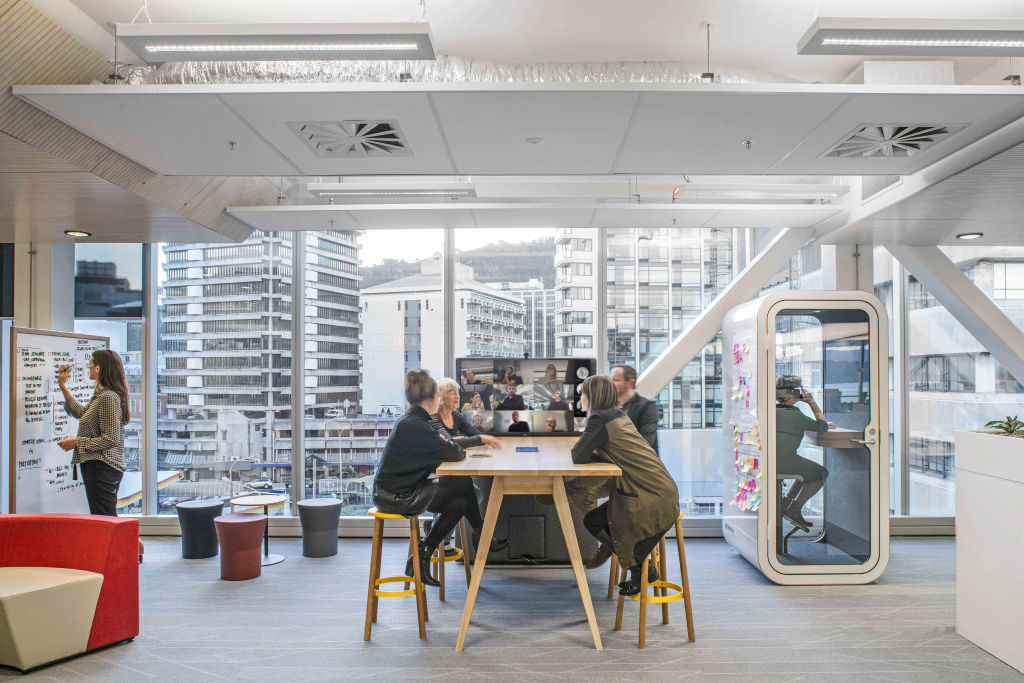
New ‘rules of engagement’ around hybrid collaboration
A microphone that’s accidentally muted … A naked roommate emerging from the bedroom in the background … A stray cat filter on a Zoom call. Remote working can result in some hilariously epic fails as well as career damage and cracks in company culture.
But now Dexus, with a $43.5 billion property portfolio, has just completed a major workplace research project with architects Warren and Mahoney to establish a new set of ‘rules of engagement’ around hybrid collaboration.
“There’s so much commentary about hybrid working and what’s right for an organisation, but there aren’t a lot of concrete ideas or suggestions or solutions for the various problems,” said Dr Kirsten Brown, principal workplace consultant at Six Ideas by Dexus. “We want to make hybrid collaboration more effective.
“That’s critical for driving work forward in order to exchange information through to making good changes or innovating in the organisation. There’s a whole ecosystem there from IT and etiquette to how to host hybrid meetings in a way that’s consistent with a company’s culture.”
The study held a series of workshops and surveys over four months and involved more than 140 people from 11 different legal, local and state government consulting, design and scientific organisations. While 56 per cent of the participants were in the commercial office five days a week before the pandemic, only 6 per cent expected to be back for full working weeks afterwards.
So with hybrid collaboration – defined as two or more people in the room and at least one person calling in from elsewhere – likely to continue far into the future, Dexus and Warren and Mahoney came up with the report Hybrid collaboration: Industry research exploring limitations and solutions for distributed collaboration to address potential problems and provide guidelines on how to make it as successful as possible.
The most important, they felt, is to establish a ‘hybrid etiquette’ that all should follow, in an atmosphere of mutual respect and support. The guidelines to that include nominating a facilitator, clarifying whether a meeting is formal or informal, defining expectations – like cameras on or off – checking in to see if everyone can see/hear you adequately, and nominating a way to capture ‘side’ conversations.
“Little things can make a big impact,” said Warren and Mahoney principal Tamara White. “This might seem like common sense but very few organisations we spoke to had formalised guidelines to drive better hybrid experiences, despite widespread dissatisfaction.
“Simple fixes can be very effective. At an organisational level, maybe even a page of suggestions of etiquette could be circulated or a little video developed around the rules to engage everyone in the conversation.”
The quality of the hybrid environment is also paramount: making sure everyone can see and hear clearly, and ensuring the design of workspaces helps create the conditions for good communication.
Often technology hasn’t kept pace with the enormous demands now being put on it, as an increasing number of people resort to Microsoft Teams, Zoom and Google Meet.
“There can be a range of problems here, too,” said Brown. “For those who are remote, they might not be able to see or hear people in the room and there can be genuine feelings of being isolated and not being involved, and not being invited to share their opinions.
“There might not be a break in the meeting for them to have a say, or cameras may be in the wrong place – too high or too low – with audio that’s difficult to hear. One person talked about being in a meeting where everyone else was eating and the noise of knives and forks clinking on plates was excruciating.”
For those in the office, there also needs to be smart design that gives them spaces to collaborate with those elsewhere that don’t impinge on the comfort of their colleagues around them.
The culture of an organisation also directly affects how well hybrid collaboration can work. The more hierarchical and rigid a company, for instance, the more difficult it might be for employees. ‘Flatter’ lines of responsibility and flexible, more agile forms of working can be a culture that makes it easier to adapt to the different modes of work.
The rules, the expectations and the ways of participation all need to be outlined and refined. Additional tools like whiteboards can also be used to make the transfer of information easier, while design of spaces can be augmented by sensory cues like colour, texture, music and lighting to set the tone.
While the study revealed that many collaborators are having second-rate experiences when it comes to hybrid activities, if these can be improved, the advantages of hybrid working can far outweigh the downsides.
“It’s important to recognise the positives people see from hybrid working,” Brown said. “They can involve more experts because it’s easier to invite people from geographically different areas to call in remotely, and it can be very inclusive for everyone, and help attracting, and retaining, talent.
“With investment in optimising behaviours, space and culture, the experience can be improved so organisations can benefit fully from the power, and value, of effective hybrid collaboration.”










